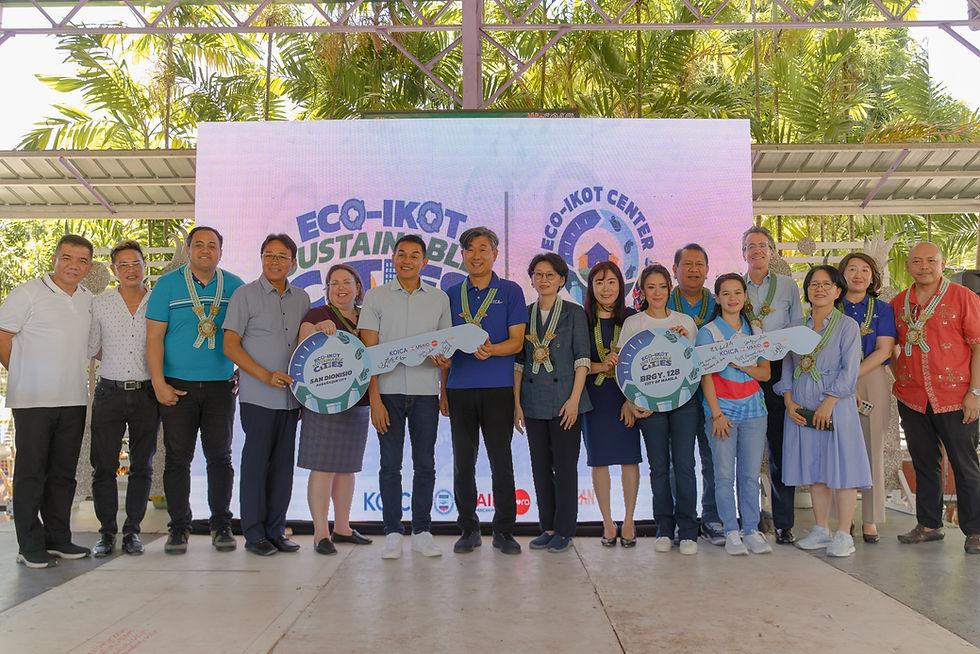CORA signs MOA with barangay for new ‘Eco-Ikot Center’ in Tondo, Manila
- CORA Philippines

- May 29, 2024
- 4 min read
Non-profit organization Communities Organized for Resource Allocation (CORA) and the local government of Barangay 128 in Tondo, Manila, recently forged an agreement to establish a center that promotes sustainable waste management and environmental conservation efforts.

CORA Founder and Executive Director Antoinette Taus led the signing of the memorandum of agreement with Barangay 128 Chairman Sigfred Hernane, Barangay Councilor Wendy Cañeda, and Eco-Ikot Sustainable Cities (EISC) Program Manager Aiyan Montoya.
"We look forward to this wonderful partnership towards enhancing the local community’s solid waste management systems through the circular economy, the reduction of waste and by empowering women champions as leaders. With strong political will and dedication from the community, we can build healthy and sustainable communities together," CORA Founder and Executive Director Antoinette Taus said.
The Eco-Ikot Center is an inclusive and holistic recycling system that allows communities to exchange clean, dry, and segregated recyclables for points, which can be redeemed for various incentives like fresh vegetables, electronic cash, and other sustainable items.
The signing of the memorandum of agreement (MoA) marked an important step in addressing environmental sustainability and waste management through the integration and establishment of the center.
"This is the first time that Barangay 128 has received this kind of incredible support through the partnership with CORA, the Korea International Cooperation Agency, and the United States Agency for International Development. We are grateful to have been chosen as one of the recipients of this project," Barangay 128 Chairman Sigfred Hernani said.
"Smokey Mountain" on waste management
Barangay 128, also infamous for the former landfill "Smokey Mountain," is one of the densely populated districts in the City of Manila. It faces challenges related to urbanization, such as waste management, congestion, and social services.
The community is also known for its strong leadership and sense of initiatives aimed at improving environmental sustainability and waste management, given its urban context and the pressing need for innovative solutions to enhance the quality of life for its inhabitants.
A survey by Clean Air Asia in 2021 showed that the majority of residents are aware of air pollution issues and recognize their adverse effects on health. The survey also found that respiratory problems are common among the community, significantly impacting children and the elderly.
Another recent Clean Air Asia study showed a significant amount of recyclable materials in Barangay 128, indicating a potential for recycling programs. It also identified the need for a materials recovery facility (MRF) to solve the community's waste management challenges.
Eco-Ikot Center as a champion of sustainable solutions
The Eco-Ikot Sustainable Cities Program, led by CORA in partnership with Korea International Cooperation Agency (KOICA), United States Agency for International Development (USAID), and Our Sea of East Asia Network (OSEAN), aims to tackle environmental challenges by implementing innovative waste management solutions in collaboration with local communities through the Eco-Ikot Center.
This initiative is part of the ongoing, five-year US$ 8.2 million "Enhancement of Marine Litter Management in Manila Bay (EMLM) Project" being implemented by KOICA, the Department of Environment and Natural Resources (DENR), and USAID.
Launched in 2022 and the first of its kind in the Philippines and the world, the CORA Eco-Ikot Center provides a sustainable solution to the plastic pollution crisis that can be inclusively established in any community and can provide livelihood and incentives to its local citizens.
Another key feature of the Eco-Ikot Center is empowering women in the communities as "Women Champions" and equipping them with specialized training on waste management, business, and sustainable practices such as composting, urban gardening, and renewable energy.
As of May 2024, the Eco-Ikot Center has diverted over 60,000 kilograms of recyclables and prevented unsegregated waste transfer to landfills. The initiative has also empowered women to be leaders in waste management and fostered partnerships with businesses to achieve Extended Producer Responsibility (EPR) targets.
Communities Organized for Resource Allocation (CORA) is a non-profit organization that addresses global issues such as hunger, poverty, inequality, and climate change. Through community-based initiatives and partnerships, it strives to create sustainable solutions for a better world.
###
About CORA Philippines
Communities Organized for Resource Allocation (CORA) is a non-profit organization established in 2016 that fosters sustainable development through missions focused on addressing hunger and poverty, plastic pollution, climate action, biodiversity conservation, and women's economic empowerment. Learn more about CORA by visiting www.wearecora.org.
About KOICA
The Korea International Cooperation Agency (KOICA) is a government agency under the Ministry of Foreign Affairs of the Republic of Korea mandated to provide Official Development Assistance (ODA) grants to partner countries. The KOICA Philippines Office was formally established in 1994 to help support the sustainable economic development of the Philippines. KOICA Philippines has been implementing various development programs and projects in the fields of urban resilience, rural development, health, transportation, governance, HRD, education, and disaster risk reduction, among others.
About USAID
The United States Agency for International Development (USAID) is the world’s premiere international development agency and a catalytic actor driving development results. A long-time ally of the United States and the oldest democracy in Southeast Asia, the Philippines is a key partner in promoting resilient and inclusive development in the Indo-Pacific. For more than 60 years, USAID has worked with the Philippine government and local organizations to achieve shared development goals and build a more prosperous, resilient society for Filipinos.
About OSEAN
Our Sea of East Asia Network (OSEAN) is a non-profit civic group and research institute from South Korea dedicated to protecting the marine environment from litter pollution through investigation, research, education, policy development, and international cooperation.


Comments